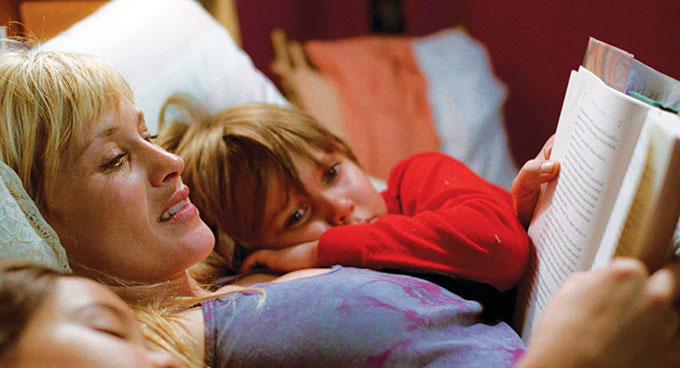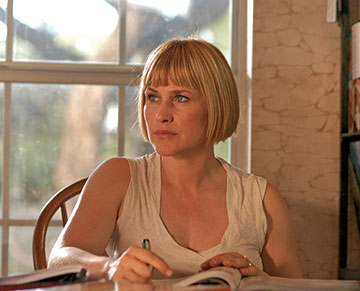Patricia Arquette on "Boyhood"
by M. Faust

Veteran Actress describes acting in Richard Linklater’s new film
Richard Linklater’s Boyhood is a great American movie, an intimate epic on universal themes that isn’t quite like anything else you’ve ever seen. You don’t have to take my word for it: at MetaCritic.com, the site that compiles reviews from the nation’s top publications and derives an aggregate score, it rates an unprecedented 100%.
The subject matter—a boy’s life from the age of five to the time he leaves for college—isn’t unusual, but Linklater’s method is. He chose four actors—two adults (Patricia Arquette and Ethan Hawke) and two children (Ellar Coltrane and Lorelei Linklater)—who agreed to work with him for a few weeks every year over a period of twelve years.
Filmgoers have had other opportunities to watch actors age with their roles over periods of years. There’s Francois Truffaut’s Antoine Doinel series, which featured Jean-Pierre Leaud as the same character in six films (beginning with The 400 Blows) made over the course of 20 years. Linklater himself has filmed Hawke and Julie Delphy as a couple in three films—Before Sunrise, Before Sunset and Before Midnight—covering nearly the same span.
But in Boyhood, Linklater makes the incremental aspect of growth the very subject of his film. He proceeds so gradually that you don’t initially see it happening, and the plot’s dramatic incidents are underplayed. Yet the cumulative impact is remarkable. (The same thing was done a few years ago on a slightly smaller scale by the estimable British filmmaker Michael Winterbottom in an excellent film called Everyday, which charts five years in the life of a young family as the father is in jail for drug charges.)
As a character inspired at least in part by Linklater’s own childhood, young Ellar Coltrane is the focus of the film. But as the mother of this family, trying to get an education and start a career while raising two children with little help from their mostly absent father, Patricia Arquette is the film’s dramatic centerpiece. That she glues the film together so capably should surprise no one who has followed her career since the late 1980s, steadily chosing parts for their value rather than how they would advance her in Hollywood. I spoke to her recently by phone about her involvement in this unique project.

AV: How did Richard Linklater pitch this film to you?
Arquette: Well, he called me and said, “What are you going to be doing for the next 12 years?”
My son Enzo was 12 years old at that point, and I already saw that his life was moving like a blur. I wanted to see that on screen, I wanted to see that happen. So I said “Great, let me read a script.” Richard said, “I don’t have one.” We talked for a long time about parenting and motherhood and our mothers and other mothers. I asked him how was he going to get financing for such a crazy project? But a month later he called me back and said, “It looks like we’re gonna do this thing.”
AV: Was the original idea to shoot for one week every year for twelve years?
Arquette: There was some juggling involved. I had a baby at one point so it was more like 16 months between those two. And it wasn’t the same time of year every year. Sometimes it was in fall, sometimes it was in summer.
AV: I understand it’s at least somewhat autobiographical for Linklater: he was raised by a single mother, they moved around Texas a lot, like the family in the film. Did he have it all mapped out from the beginning, or did it evolve as it went along?
Arquette: There are some elements of his life, but I know for sure it’s not all of them because there are a lot of other people’s stories in there that I heard come out in the room [during rehearsals].
I think he left a lot of room to see who the kids became, because a lot of it was in the casting. If Ellar had grown up to be a big football jock, the story would have had different trajectory. You’re yo-yo’d around by your parents’ choices until you start to mature and you start making your own choices where your interests take you. So Richard left room to see how that developed.
AV: Did he take same approach to the adult characters?
Arquette: There was more certainty with them. They were more tired from the road, [My character] Olivia lost a lot of her girlishness along the way—responsibility can do that to you. She’s been disappointed by bad relationships. She also came to a place where she liked herself, didn’t need as much, was happy with having less pressure.
AV: How did it feel to see the finished film and watch yourself changing over the course of three hours?
Arquette: It is odd watching yourself develop in a short period like that. You do see your face everyday in real life and you see in it reminders of your youth, but its not the same as watching it so quickly. But that’s what we were excited about this film. Acting is a business that demands you not get older. We wanted to do that authentically and realistically. We wanted it to be truthful and we didn’t want to Hollywood it up.
AV: There’s a moment late in the film where Olivia has a meeting with someone who she influenced when he was a young man, thanking her for the effect she had on him. In your mind, what was Olivia feeling there?
Arquette: I think she’s moved, that’s she had an effect like that on somebody. She wants to cry, more about the interconnectivity of human beings, which is what we’re talking about in this movie.
It reminded me of my mom. Being a mom sometimes can be a thankless job. She was a therapist who did thousands of hours of free counseling. When she was dying I was caring for her. All these people started showing up, there was a line of them down the street, and I had no idea who they were. They were former patients she had helped coming to say goodbye. I told her they were exhausting her and that she needed to rest, but she said no, they need closure.
AV: From the perspective of your character Olivia, and as a daughter and a mother in real life, do you think that kids raise their parents?
That’s funny, I’ve said that before. Up to a certain point you raise your kids When they start maturing comfortably they call you to task and review things you did do them, asking “How could you do this?” And that’s the point where you have to pay the piper.
Part of what I really liked about this script was the characters’ blind spots. We’re all human beings, trying to grow, trying to be good people, but we have blind spots, things you don’t notice.
AV: Your grandfather was an actor (Cliff Arquette, better known to fans of The Hollywood Squares as Charley Weaver). So were your parents, and all of your siblings (Rosanna, David, Richmond and Alexis). Will there be a next generation of acting Arquettes?
Arquette: Well, my daughter just returned from making a movie in Mexico with her father [Nicolas Cage]. Her character gets shot in the back. We don’t try to push that, it’s not like we’re Mama Roses. Nor did my parents—in fact my mom was so sad when I picked this, because the school principal was always telling me how smart I was, that I could go to medical school or law school. She was not happy—this life is so hard!. But my sister [Rosanna] was already acting, she paid for my classes and was really encouraging. It was hard getting over my own fears, but I was attracted to it because I was an introverted extrovert.
Watch the trailer for Boyhood
|
Issue Navigation> Issue Index > v13n32 (Week of Thursday, August 7) > Patricia Arquette on "Boyhood" This Week's Issue • Artvoice Daily • Artvoice TV • Events Calendar • Classifieds |









 Current Issue
Current Issue